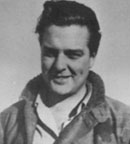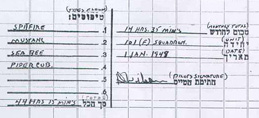 Denny Wilson
Denny Wilson Denny Wilson
Denny Wilson
Hamilton, Ontario
Combat Record
WWII: 2 kills (in Spitfire)
Before Christmas: unknown over Faluja Pocket (in Spitfire D-130)
December 31: REAF Macchi and REAF Spitfire (in Spitfire White 15)
Story
Flying Officer Wilson flew Spifires with the RCAF's 411 Squadron (in 126 Wing as part of the Second Tactical Air Force, under the command of Group Captain Gordon McGregor, later president of Air Canada) and scored two victories during WWII. Afterward, he found employment as a bush pilot in Canada.
While I was in Vancouver getting supplies (I was in a tailor's shop - this was back in the days when a crease in your pants was a necessity), a chance conversation led to my being recruited for Israel." (Bracken 1995)
Claire, Wilson's current wife, told me that it's not surprising that he was "picked up" in a tailor shop, as he had a pretty wide vain streak and always kept himself looking good. The tailor had a son in the Israeli army and sold Wilson on the idea of flying for Israel. Wilson said took the job for a variety reasons:
I had the flying bug... and it rubbed me the wrong way that the State of Israel was the underdog.... I went through Bergen-Belsen. How can you describe it? Hundreds of walking skeletons. People dying in droves.... The papers were full of stories that the combined Arab states were going to drive the Jews into the sea. I was mad I guess, and I wanted to help the underdog.
He also had a friend - Wilf Canter, a squadron leader from Peterborough, Ont. - who was flying C-47s for Israel. (Canter died on October 25, when his engine exploded after take-off from from Ekron.)
Soon, Wilson was showing his log book to a firm of lawyers, who gave him a plane ticket for travel in the fall.
I was given a ticket to Toronto, stayed in Toronto for about two weeks then was given a ticket to Geneva, by way of London. Met Jack Doyle and John McElroy. All three of us went from Geneva to Rome, where we waited for another week, then on a South African Airways aircraft to Haifa. (Cull et al 1994)
Wayne Peake also joined the three Canadians, who had fake identification papers, on the trip into Israel. While in Israel, Wilson earned 150 pounds a month.
 Upon
arrival at the 101, Wilson and the others found that the squadron had three
operational fighters: a Spitfire, a P-51 and a S-199. Wilson flew a mix of aircraft
from a Piper Cub on photo recon to the P-51D, although he didn't fly the dreaded
S-199. He spent most of his flying hours in the familiar Spitfire.
Upon
arrival at the 101, Wilson and the others found that the squadron had three
operational fighters: a Spitfire, a P-51 and a S-199. Wilson flew a mix of aircraft
from a Piper Cub on photo recon to the P-51D, although he didn't fly the dreaded
S-199. He spent most of his flying hours in the familiar Spitfire.
In late October or early November, Wilson flew Spitfire D-131 on a test flight. Its undercarriage failed to function and Wilson safely belly-landed the aircraft. Although the plane required repairs, Wilson was not hurt. An investigation revealed that sand had entered the hydraulic reservoir.
Wilson survived harrowing experiences on the ground as well as in the air. Once, he and Wayne Peake took a jeep to search for a missing plane. They passed a barbed wire fence and entered a mine field, which they only discovered after a mine blew up the rear end of the jeep. They abandoned the vehicle and walked back on the tire marks their jeep had made.
Although I don't know the date or the victim, Wilson scored an easy victory
while in Spitfire D-130 on a photo recon mission over the Faluja Pocket.![]()
...Our headquarters intercom picked up a conversation between an Egyptian pilot and his people on the ground. Apparently, he was flying supplies to his ground crew and, though I didn't know it, he was carrying no ammunition. As I was flying without ammunition, it was a surprise to me that the Egyptian pilot panicked when he saw me, and promptly bailed out, making no effort to fire at me or elude me. Obviously he thought I was armed. What a way to get an aircraft! Not a shot was fired! I was credited with a destroyed. (Bracken 1995)
Denny flew D-130 on November 20, December 1, and December 4, although which if any of these dates saw the victory remains unknown.
 Wilson
still fondly remembers Christmas 1948, for it touched him deeply. The government
of Israel organized a Christmas dinner with turkey and trimmings for the Christian
Machal pilots in 101 and followed that up with a bus ride to a Jaffa church
for Christmas mass.
Wilson
still fondly remembers Christmas 1948, for it touched him deeply. The government
of Israel organized a Christmas dinner with turkey and trimmings for the Christian
Machal pilots in 101 and followed that up with a bus ride to a Jaffa church
for Christmas mass.
(Note: Wiess and Weiss 1998 claim that Wilson took part in Velvetta 2, but a look at his log book reveals that this can't possibly be the case.)
On Dec. 29, Wilson (in Spitfire White 14) and Arnie Ruch escorted two of 69
Squadron's B-17s on a raid on the Faluja Pocket. After the bombers dropped,
the two Spitfires headed for Al Arish.![]()
We encountered five enemy aircraft over Al Arish. Three took off for home. I played with the other two. We think they were flown by Americans because they put up quite a fight. (Cull at al 1994)
As far as is known, no Americans flew for Egypt, although faulty intelligence reports at the time did have two Americans flying for the Egyptians. Wilson damaged one of the two remaining REAF Spitfires, which fled towards Al Arish, and attacked the other.
That guy was cute. He was trying to lead me over the Arab guns at Al Arish. I was nearly out of ammunition, so I broke off. (Cull et al 1994)
Wilson's most memorable mission took place on the last day of 1948. Wilson's
flight log indicates that he dive-bombed before patrolling the airspace near
Egypt's Bir Hama base.![]()
On December 31, 1948, while flying a Spitfire (White 15) on a patrol over the Sinai, I spotted an Egyptian aircraft - an Italian Fiat (Macchi) - coming back to its airfield at Bir Hama. He was below me and I shot him down - the pilot bailed out. (Bracken 1995)
On the way back, Wilson and his wingman, Syd Cohen, detoured toward Faluja.
Near the Faluja pocket, I caught an Egyptian Spit flying escort for a C-46, which was dropping canisters and supplies. I just slid in behind this Spit. He started to make a tight turn but I tightened with him. We were so short of ammunition, we'd been asked not to use our cannons. So I machine-gunned his engine cowlings. He spiraled down and blew up. (Cull et al 1994)
In fact, ammunition was always a problem, as Wilson noted:
They always told us to go easy on the ammo. A single shot from a 20mm cannon cost about four dollars. Even a .50-calibre shell ran to about 50 cents. (Bercuson archives)
After this fight, Wilson and Cohen joined up with a pair of Israeli Spitfires that were strafing a truck convoy on the Al Auja-Abu Ageila road.
We strafed them repeatedly. We had no idea of the number of transport we destroyed. (Cull et al 1994)
On the final day of the war, Jan. 7, Boris Senior and Jack Doyle in Mustangs were escorting 35 Flight's Harvards to attack Egyptians at Dir El Balah when they encountered eight REAF Macchis above the Al Auja-Rafah road.
Wilson, in Spitfire White 16 fresh from feasting on the RAF) and wingman Arnie Ruch were also in the air and found what they thought were eight REAF Macchis on their low 3. The Egyptians saw the two above them, jettisoned bombs, and climbed toward them. In fact, there were only six Macchis. Ruch and Wilson misidentified Jack Doyle and Boris Senior in P-51s as two more Macchis. The Egyptians didn't see Doyle and Senior at all.
In the ensuing battle, both Senior and Doyle claimed a kill, although Egyptian records indicate only one plane lost. Wilson, separated from Ruch in the fight, found himself in a gaggle of five Macchis (which itself indicates that only one REAF plane was lost) after the other Israeli planes bugged out. he radioed back to Chatzor, "I've got five of them cornered," and attacked.
I was left dogfighting the Fiats (sic), when I realized they were leading me into the range of the anti-aircraft guns at Al Arish. I was hit by shrapnel and subsequently found that a chunk of shrapnel was lodged in a canister of 20mm cannon shells, which fortunately did not explode. At that point, I broke off the action and returned to base after calling Arnie. (Cull et al 1994)
Wilson spent the first half of 1949 training new fighter pilots and returned to Canada in June. After the war, he had this to say about the Egyptians he fought.
To understand what we were up against, you have to understand something about the formation of the Egyptian Air Force. All its pilots were the sons of wealthy Egyptians, who became the glamor boys of the sky lanes, as it were, by joining the military air service. It was a sort of "gentleman's profession". They never expected a war to come along. As a result, although the Israeli Air Force was usually outnumbered in a dogfight, the Egyptians just didn't have their heart in it. (Cull et al 1994).

Click the badge to return to the squadron roster